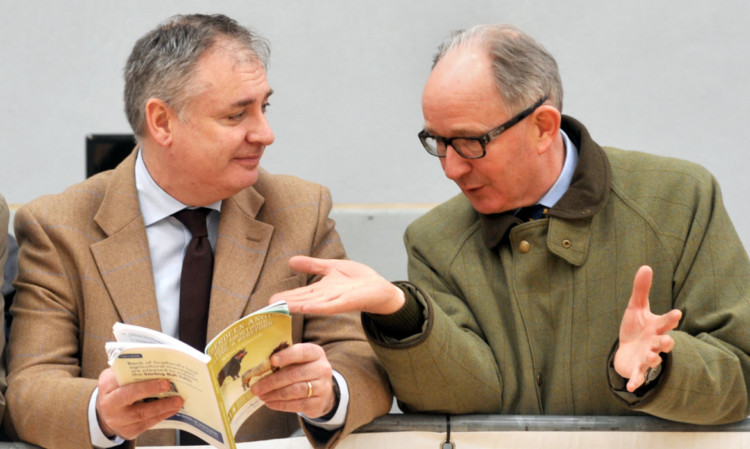Rural Affairs Secretary Richard Lochhead is no stranger to the Stirling Bull Sales, but his visit was not restricted to a walkabout.
He is in the middle of the consultation on the implementation of the new CAP, and was so keen to hear views that he held a question-and-answer session.
Although the political negotiations are all but over there is still at least one piece of unfinished business with Defra. EU regulations would allow up to 13% of the Scottish CAP pot to be spent on coupled payments, for example the Scottish Beef Calf Scheme.
Defra Secretary Owen Paterson is no fan of coupled payments and opted for the UK to have the lower rate of 8%.
Mr Lochhead said he was reluctant to leave it at that, and is this week to ask Mr Paterson to reconsider.
Asked how he would allocate the extra coupled payments if his request was granted, Mr Lochhead said this would be a matter for consultation. The sheep sector had been ambivalent about coupled payments so far, he noted, with the beef sector far keener.
Mr Lochhead admitted there had been considerable criticism of the proposal to have only two payment regions with arable, temporary grass and permanent grass in one and rough grazing in the other.
He said more regions were possible, but great care would need to be taken to make sure the new Basic Payment Scheme was deliverable and not too complicated.
Principal Agricultural Officer Drew Sloan pointed out that the argument had changed in recent weeks.
Initially farmers wanted one region for arable and temporary grass, one for permanent grass, and one for rough grazing. Now the call is for extra regions in the rough grazing category.
New entrants spokesman and Aberdeenshire farmer John Fyall said: “The beef industry is shouting about being shafted, but new entrants have already been shafted for 10 years.”
He argued that it was ridiculous for established beef farmers to be looking at the ‘Scottish tunnel’ or other ideas which would prolong the historical basis for calculating subsidy.
“Can you give me one reason why someone with 10 years of big subsidy should get it for another six years?” he asked Mr Lochhead.
The Cabinet Secretary replied: “It is impossible to defend payments that could go on until 2020 or even 2025 when they are based on activity in 2000 to 2002.
“But at the same time I have to look at the impact of cutting back support too hard and too quickly.”
NFU Scotland president Nigel Miller said that while he defended the right for new entrants to receive support straight away, it was a case of being careful not to close off options for the run-down of historical payments.
“Whatever way you cut it this deal is not going to be fair for everyone.
“If we get it wrong the first casualties won’t be farmers but all these in the ancillary trades such as agricultural engineers and feed mill workers. Theirs will be the jobs that go first,” he said.
